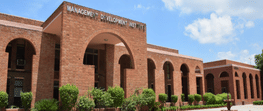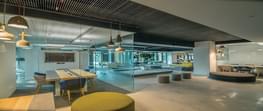Prof. R. Srinivasan is the Director & Professor, of SOIL School of Business Design (SOBD), Gurgaon. He holds a PhD from FMS, University of Delhi, in Financial Risk Management and has more than 37 years of experience in the IT industry, teaching, research, and consultancy. Prior to joining SOBD, he worked as Head, of KSOM; Associate Dean, NMIMS, Indore campus; and Director at Amity University, Noida. In his past association as part of NMIMS, Amity University, and others, Dr. Srinivasan had been part of various committees and sub-committees, such as Faculty Recruitment Committee, Accreditation Committees, Quality Assurance and Enhancement Committee, and Industry Interaction Cells.
Professor Srinivasan has also served as the Chair of the Board of Studies, Academic Council, Quality Assurance, Disciplinary Committee, etc. He is invited as an expert by CISR-NISTADS, Government of India, New Delhi, as an expert in their various projects. He is also invited as a subject expert by the National Institute of Smart Government (NISG), a Government of India funded body. He has worked on European Union Funded research projects and was consultant to the University of Applied Sciences, Frankfurt, Germany; the Nomura Research Institute (NRI), Gurgaon; and Technova Global Pvt. Ltd., Gurgaon. He had also been associated with some of the leading B-schools, like IIFT, IMI, New Delhi; IMT, Ghaziabad; and IILM, New Delhi, in different capacities. His teaching and research interests are Finance, Accounts, Financial Modelling, Financial Risk Management, Analytics, etc. His research papers have been published in several leading international and national indexed/refereed research journals and he has also developed case studies on Foreign Exchange Management.

What is your philosophy of leadership? How would you describe your leadership style?
My philosophy of leadership is Servant Leadership, where I want to focus on the needs, growth, and well-being of my subordinates. Empathy, listening, and empowerment are the paths I want to adopt to lead people. I want to foster an atmosphere of continuous learning and promote an environment of self-improvement for all in the organisation.
How does the curriculum of the college ensure the best practice of industry?
We follow the process of assessing the competencies that students need to be industry ready. We do so by analysing industry trends, consulting with employers, surveying current students and alumni, and considering feedback from faculty and advisory boards. Based on the needs assessment, define clear and measurable learning objectives for the curriculum.
Any insights into how your institute could be more welcoming to students of different races or economic backgrounds?
At SOIL School of Business Design, we welcome diversity among faculty, staff, and students, and try to attract people from different races, ethnicities, and socioeconomic backgrounds. We provide equal opportunities for all and provide scholarships and financial aid as well. Anyone who is able to meet our eligibility criteria can take admission.
What do you think your roles and responsibilities to the Institution and the students are?
My primary responsibility is to provide strategic direction and leadership to the institution, aligning goals and initiatives with the vision, mission, and values of the organisation. I also oversee the financial health and sustainability of the institution to support academic programs, faculty, staff, and facilities, along with managing day-to-day operations and administrative functions of the institution, including compliance with regulatory requirements, and institutional policies. I also promote academic excellence and quality assurance so that student learning outcomes are achieved and work at cultivating positive relationships with government agencies, industry partners, alumni, and the broader community to enhance the institution's reputation. Moreover, I oversee the delivery of student services and support programs, counselling, career services, housing, health services, and extracurricular activities, solicit feedback from students and actively communicate with them to understand their perspectives, address their concerns, and involve them in decision-making processes that affect their experiences.
What do you think should be the Institution’s top priority over the next 10 years?
Over the next decade, we will stay abreast of technological advancements and integrate them into the curriculum. We will develop students' cross-cultural competence and help them adopt a global mindset. We will also emphasise the importance of sustainability, social equity, and ethical practices in business and increase opportunities for better internships, projects, and entrepreneurial experiences to provide students with practical skills and industry exposure. We will also strengthen partnerships and collaborations with industry, government, non-profit organisations, and other academic institutions to enhance research impact, industry relevance, and student opportunities.
Check Soil School of Business Design Coursse & Fees
What would you like people to know about your Institute they may not know?
Design thinking, social innovation, and inspiring leadership are the three most important dimensions of SOIL School Business Design. Integration of Howard Gardner’s multiple intelligence framework into the curriculum through workshops, theatre, role-plays, sports, art, culture, etc. are some of the unique features of the institute.
What do you see as your college’s greatest strengths?
Our greatest strength would be adopting a multidisciplinary approach to education. We have also established several clubs and academies, experiential Fridays, and design thinking workshops. We also occasionally organise theatre, yoga and mindfulness workshops, which are some of the initiatives that help students develop well-rounded personalities.
What are some of the biggest challenges you see, both for higher education in general and for your college specifically?
Access to quality higher education for all seems to be the biggest barrier at the moment. The availability of affordable education is another barrier. Ensuring effective governance, transparency, and accountability in higher education institutions is the third major challenge. We are actively working on solving these issues.
Any suggestions you would like to give to the current youth?
I would advise students to adopt a mindset of lifelong learning. You must also develop critical thinking skills to solve complex problems foster resilience and be more adaptable. This will help them embrace challenges as opportunities, build strong relationships, and practice empathy and compassion to understand different perspectives. All of these help you become a well-rounded individual.
How do you tend to establish a healthy relation and environment in institute?
To establish a healthy relationship and environment in an institute, we create a culture of trust and respect among all. In order to achieve this, we promote collaboration and open communication among all. Overall, we emphasise taking care of the well-being of all stakeholders.












![Great Lakes Institute of Management - [GLIM]](https://image-static.collegedunia.com/public/college_data/images/appImage/1570797811croppedgreatlakese.jpg?h=111.44&w=263&mode=stretch)

![IILM Institute for Business & Management [IILM-IBM]](https://image-static.collegedunia.com/public/college_data/images/appImage/1501494596IILM.jpg?h=111.44&w=263&mode=stretch)



![Amity Business School - [ABSM] Manesar](https://image-static.collegedunia.com/public/college_data/images/appImage/17149_ABSH_APP.jpg?h=111.44&w=263&mode=stretch)


![MBA/PGDM | admission | 2024 | Narsee Monjee Institute of Management Studies - [NMIMS Deemed to be University]](https://image-static.collegedunia.com/public/college_data/images/logos/1506323004Logo.jpg?h=72&w=72&mode=stretch)




![MBA/PGDM | admission | 2024 | Indian Institute of Management - [IIMC]](https://image-static.collegedunia.com/public/college_data/images/logos/1488950580d2.png?h=72&w=72&mode=stretch)













.png?h=72&w=72&mode=stretch)
.png?h=72&w=72&mode=stretch)

 (1).png?h=72&w=72&mode=stretch)


![IFMR Graduate School of Business - [IFMR GSB]](https://image-static.collegedunia.com/public/college_data/images/logos/1569041003logo3.png?h=72&w=72&mode=stretch)

![Birla Institute of Management Technology - [BIMTECH]](https://image-static.collegedunia.com/public/college_data/images/logos/1603104226logo.png?h=72&w=72&mode=stretch)
![New Delhi Institute of Management - [NDIM]](https://image-static.collegedunia.com/public/college_data/images/logos/1479734694logo new.png?h=72&w=72&mode=stretch)
![Universal Business School - [UBS]](https://image-static.collegedunia.com/public/college_data/images/logos/1474366585ugs.jpg?h=72&w=72&mode=stretch)
![Fortune Institute of International Business - [FIIB]](https://image-static.collegedunia.com/public/college_data/images/logos/1731138049Screenshot20241109130918.png?h=72&w=72&mode=stretch)
![FORE School of Management - [FSM]](https://image-static.collegedunia.com/public/college_data/images/logos/1638621630logo.png?h=72&w=72&mode=stretch)



![Great Lakes Institute of Management - [GLIM]](https://image-static.collegedunia.com/public/college_data/images/logos/1476354400logo.jpg?h=72&w=72&mode=stretch)
![Institute of Management Technology - [IMT]](https://image-static.collegedunia.com/public/college_data/images/logos/1689580906Untitled.png?h=72&w=72&mode=stretch)

![Jagdish Sheth School of Management - [JAGSOM]](https://image-static.collegedunia.com/public/college_data/images/logos/1758085939Screenshot20250917103545.webp?h=72&w=72&mode=stretch)

Comments